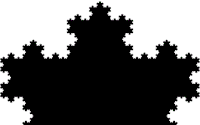
Photo from wikipedia
Progressive iterative approximation (PIA) technique is an efficient and intuitive method for data fitting. In CAGD modeling, if the given data points are taken as initial control points, PIA process… Click to show full abstract
Progressive iterative approximation (PIA) technique is an efficient and intuitive method for data fitting. In CAGD modeling, if the given data points are taken as initial control points, PIA process generates a series of shaping curves by adjusting the control points iteratively, while the limit curve interpolates the data points. Such format was used successfully for Shepard-type curves. The aim of the paper is to construct simple variants of the PIA method for Shepard-type curves producing novel curves modeling data points, so the designer can choose among several pencils of shapes outlining original control polygon. Matrix formulations, convergence results, error estimates, algorithmic formulations, critical comparisons, and numerical tests are shown. An application to a progressive modeling format by truncated wavelet transform is also presented, improving in some sense analogous process by truncated Fourier transform. By playing on two shapes handles—the number of base wavelet transform functions and the iteration level of PIA algorithm—several new contours modeling the given control points are constructed.
Journal Title: Symmetry
Year Published: 2022
Link to full text (if available)
Share on Social Media: Sign Up to like & get
recommendations!